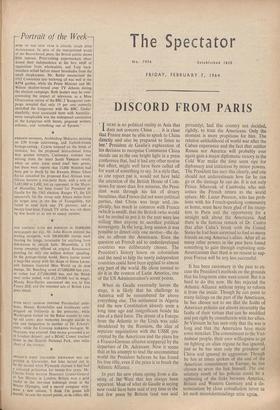DISCORD FROM PARIS
T HERE is no political reality in Asia that 1 does not concern China . . . it is clear that France must be able to speak to China directly and • also be prepared to listen to her.' President de Gaulle's explanation of his decision to recognise Communist China stands out as the one bright light in a press conference that, had it had any other motive but effect, might well have been called off for want of something to say. In a style that, as one report put it, would not have held the attention of the British House of Com- mons for more than five minutes, the Presi- dent went through his list of dreary banalities, that France did not want political parties, that China was large and, /im- plicitly, has much in common with France (which is small), that the British (who would not be invited to put it to the test) were less willing than anyone to sacrifice political sovereignty. In the long, long session it was possible to detect only one motive—the de- sire to affront the Americans. Even the question on French aid to underdeveloped countries was deliberately chosen. The President's history lesson on colonialism and the need to help the newly independent countries could have been applied to almost any part of the world. He chose instead to do it in the context of Latin America, one of the US Administration's sorest 'points.
When de Gaulle eventually leaves the stage, it is likely that his challenge to America will be remembered far above everything else. The settlement in Algeria and the new Constitution already seem a long time ago and insignificant beside his aim of a third force. The dream of a Europe from the Atlantic to the Urals was cold- shouldered by the Russians, the idea of separate negotiations with the USSR pre- empted by the Americans and the plans for a Franco-German alliance scuppered by the departure of Dr. Adenauer. Now it seems that in his attempt to lead the uncommitted world the President believes he has found his true role, even if the price is to break the Atlantic Alliance.
In part his new plans spring from a dis- unity of the West that has always been apparent. Most of what de Gaulle is saying now could have been said at any time in the last few years by Britain (and was said , privately), had this country not decided, rightly, to trust the Americans. Only the moment is more propitious for him. The relative unlikelihood of world war after the Cuban experience and the fact that neither Russia nor America will probably ever again gain a major diplomatic victory in the Cold War make the time seem ripe for diplomacy and initiatives by minor powers. The President has seen this clearly, and one should not underestimate how far he can go or the damage he can do. It is not only Prince Sihanouk of Cambodia who wel- comes the French return to the world sphere. Mr. Lester Pearson, who has prob- lems with his French-speaking community at home, must have been glad of his recep- tion in Paris and the opportunity for a straight talk about the Americans. And there is the famous remark of Dr. Castro that after Cuba's break with the United States he had been surprised to find so many friends among America's allies. After all so many other powers in the past have found something to gain through exploiting anti- Americanism that there is no reason to sup- pose France will be any less successful.
It has been customary in the past to ex- cuse the President's methods on the grounds that his long-term aims were sound. But it is hard to do this now. He has rejected the Atlantic Alliance without trying to reform it from the inside. Though he can point to many failings on the part of the Americans, he has chosen not to see that the faults of American policies are almost invariably the faults of their virtues that can be modified and put right by consultation with her allies. In Vietnam he has seen only that the war is long and that the Americans have made some mistakes. The commitment to the Viet- namese people, their own willingness to go on fighting an alien regime he has ignored, just as he has seen only the grandeur of China and ignored its aggression. Though he has at times spoken of the end of the American commitment to Europe, he has chosen to sever the link himself. The one salutary result of his policies could be a tightening of the links between America, Britain and Western Germany and a de- termination by close consultation never to let such misunderstandings arise again.






































 Previous page
Previous page